 Petzlover
Petzlover Abyssinian is originated from Ethiopia but Jaguarundi Curl is originated from United States. Both Abyssinian and Jaguarundi Curl are having almost same weight. Abyssinian may live 7 years less than Jaguarundi Curl. Both Abyssinian and Jaguarundi Curl has same litter size. Both Abyssinian and Jaguarundi Curl requires Low Maintenance.
Abyssinian is originated from Ethiopia but Jaguarundi Curl is originated from United States. Both Abyssinian and Jaguarundi Curl are having almost same weight. Abyssinian may live 7 years less than Jaguarundi Curl. Both Abyssinian and Jaguarundi Curl has same litter size. Both Abyssinian and Jaguarundi Curl requires Low Maintenance.
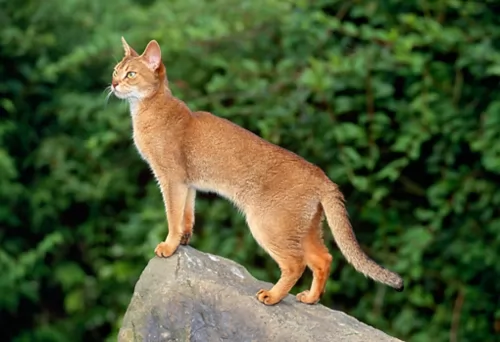 Known also as the Bunny Cat or the Abys, the Abyssinian cat hails from Abyssinia which is today known as Ethiopia.
Known also as the Bunny Cat or the Abys, the Abyssinian cat hails from Abyssinia which is today known as Ethiopia.
It is believed that the cat was brought to the UK in the 1860s. At first the cat was crossed with British Shorthairs, and later with oriental breeds.
The cat was imported in 1900 to America with some breeding programs starting in the United States in the 1930s. It is thought that it was a good thing that cats were exported to the U.S. because World War II took a toll on breed numbers but the breed was built up again in the USA.
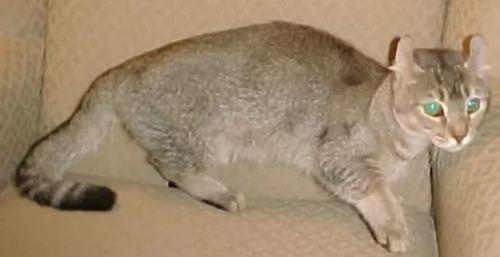 Found mostly in Central and South America, the Jaguarundi Curl has been bred to look like a wild cat. - the Jaguarundi.
Found mostly in Central and South America, the Jaguarundi Curl has been bred to look like a wild cat. - the Jaguarundi.
It was in the 1940s that the cat was also found in Florida. It is a result of a crossing between the Hyland Lynx with Munchkins and possibly other short-legged domestic cats.
The Munchkin cat is a medium-sized cat and it also has very short legs – the result of a genetic mutation.
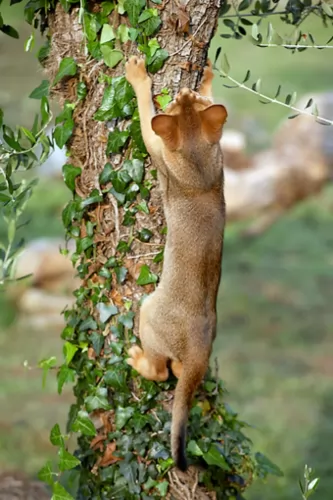 The Abyssinian is a slender, lithe, fine-boned, medium sized cat with shortish to medium length silky hair and long, slender legs.
The Abyssinian is a slender, lithe, fine-boned, medium sized cat with shortish to medium length silky hair and long, slender legs.
The fur has a distinctive ticked look. The coat comes in several colors – but its base color is a glossy reddish-brown base with black ticking.
You’ll find that the feline reaches a height of 20-25 cm and that its length is roughly 30-41 cm. When your Abyssinian is an adult it will weigh about 4-5 kg. With good care, your feline pet can reach up to 13 years of age.
The kittens are born with dark coats, but as they mature, the coat lightens. The head of the cat is somewhat wedge-shaped and it has fairly large ears with big almond-shaped eyes. The eyes can be green or hazel, depending on the coat shade. The tail is long and tapering.
The Abyssinian loves leaping onto cupboard tops or anything that has some height. It's an intelligent cat this Aby and always on the go. He is a playful cat and just loves being the center of attention, and when he has lots of toys he is always occupied, entertaining you with his antics.
If you were to be away at work every day, it would be a good idea to have a friend for him because he’s the kind of cat that becomes bored and lonely and then he becomes naughty. This cat is known as a clown with its outgoing, mischievous nature.
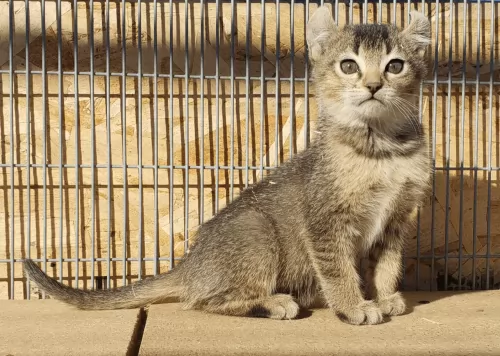 This is a medium-sized, strong, muscular wild cat with short legs, a large head and small ears that are curled and set wide apart.
This is a medium-sized, strong, muscular wild cat with short legs, a large head and small ears that are curled and set wide apart.
The eyes are wide-set and are large and expressive. The eyes can be gold, green or even blue.
The cat can weigh anything between 6 and 10kg. They can take up to years to reach their weight. The tail of the cat is long and thick, the body long and muscular.
The short coat is a ticked or a spotted pattern and can come in various colors. In most cats, the coats are tawny or solid like the Jaguarundi. In ideal specimens, coats will be tawny or solid like the Jaguarundi.
Maybe it’s the cat’s wild side but the Jaguarundi Curl cat is a shy, elusive and somewhat solitary cat. In the wild these cats only socialize to mate.
It is, however, a very vocal cat. The cat is also a good climber and swimmer and you will need to invest in climbing equipment.
If your Jaguarundi Curl has more Munchkin in him, you may find him far more sociable and actually seeking out the company of his human family.
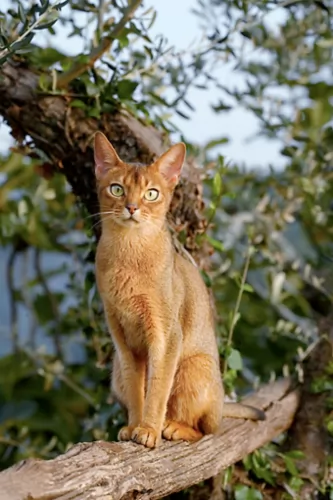 Your active Abyssinian cat is such a pleasure to have in the home as these cats love their human family as well as other pets in the home.
Your active Abyssinian cat is such a pleasure to have in the home as these cats love their human family as well as other pets in the home.
He’ll talk to you in a quiet way. They’re playful cats and you want to make sure you supply him with some stimulating toys.
Remember to brush his coat gently and make it a special therapeutic, bonding time. Make sure your active cat has exercise and provide some climbing equipment for him. Most of all he just wants to be around you and to get your loving attention.
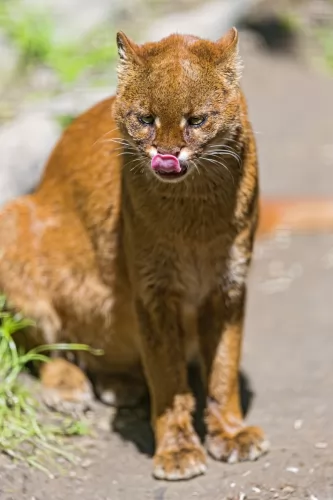 The wild Jaguarundi is smallish cat that is a little bit larger than a house cat.
The wild Jaguarundi is smallish cat that is a little bit larger than a house cat.
Some people like keeping these mixed-breed, hybrid cats, and they can make good pets, but they do tend to be reclusive. You have to remember that with these cats, part of their genetic makeup is a wild cat, and this just means that you can’t really be sure how they will turn out.
Think twice before you buy a cute little Jaguarunndi Curl kitten. Cat Rescue shelters are seeing a massive escalation in the number of hybrid cats who are just abandoned by their owners.
They wanted a ‘wild-type’ cat and ended up with behavior from the cat that they couldn’t handle. How cruel is that. Its the human's fault, not the cat.
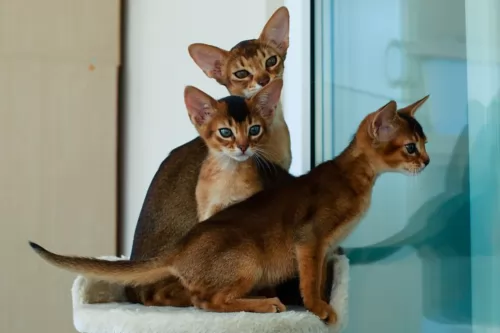 The Abyssinian has been known to be prone to kidney disorders. It can also be prone to gingivitis which can lead to periodontal disease.
The Abyssinian has been known to be prone to kidney disorders. It can also be prone to gingivitis which can lead to periodontal disease.
Also, the Abyssinian has been known to have problems with blindness. An eye problem, called progressive retinal atrophy is where the cells deteriorate over time and this is what causes the blindness.
The Abyssinian can also be prone to patellar luxation where the kneecap can become dislocated.
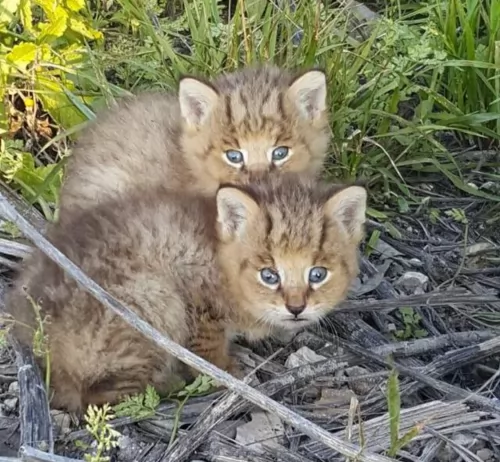 Hybrid cats do have some health issues because of their breeding. Cat owners who choose these cat breeds need to know that they have special needs.
Hybrid cats do have some health issues because of their breeding. Cat owners who choose these cat breeds need to know that they have special needs.
You should speak to your vet about the health of your cat. Domestic cats and wild cats have a different number of chromosomes. These cats wouldn’t normally mate so that when they are crossed during breeding, an abnormal genetic makeup is a result.
Reproductive problems in cats like the Jaguarundi Curl become a common occurrence and stillbirths can be the norm. Often you’ll find that some of the cats are infertile, whether male or female.
You've also got to be aware of vaccines as sometimes they don't work with these hybrid cats. Many times a cat like this is exposed to rabies and you'll find that the vaccine was ineffective.
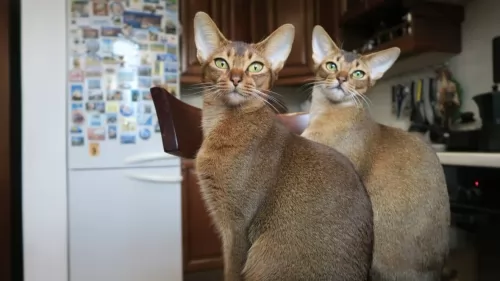 The Abyssinian cat’s short, fine coat is easy to care for. Brush and comb it timeously to remove loose hairs.
The Abyssinian cat’s short, fine coat is easy to care for. Brush and comb it timeously to remove loose hairs.
Because of periodontal disease, brush your cat's teeth. If you feel you don’t know how to perform any of these ‘caring’ routines for your kitty kat, don’t despair as your vet can do a dental cleaning procedure as well as your pet groomers.
Your Abyssinian cat is carnivorous and will need food similar to that which they would prey on in the wild. Your cat will require foods high in protein and with added vitamins and minerals.
Avoid cat foods that add in useless fillers such as wheat and soy. It is important that you buy the right cat food for your Abyssinian, and if you’re in any doubt, speak to your vet. Make sure your cat always has access to a bowl of fresh, cool water.
Always keep your Abyssinian’s litter box spotlessly clean. You can keep a special little plastic rake to rake up the sand and rid the box of cat droppings immediately.
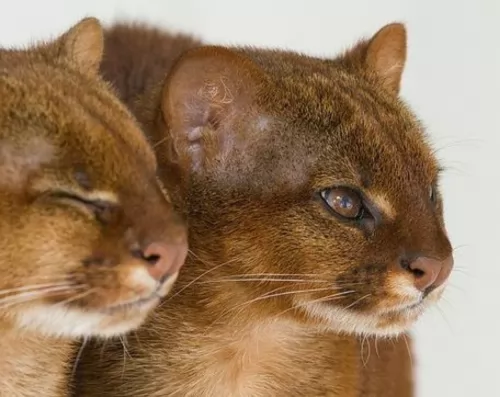 Be prepared for the new arrival of your cat. Have food and water bowls, warm bedding, toys, litter box, and food all available and waiting.
Be prepared for the new arrival of your cat. Have food and water bowls, warm bedding, toys, litter box, and food all available and waiting.
Your Jaguarundi Curl doesn’t require a specialized diet. You can feed him much the same as your other domestic cats.
The food needs to be high-quality and can be wet or dry food, so long as it makes sure that meat is the top ingredient. Your cat is a carnivore and will require meaty meals to remain healthy. Dietary supplements or vitamins can only do your Jaguarundi Curl good.
You can brush the coat once each week to remove loose hair and to keep the coat shiny.
You want to provide your cat with a litter box and keep it clean too. These hybrid cats don’t easily learn to use the litter box as they should, and they may do their business around your home as opposed to using the litter box.
Get your pet a collar and tag to identify your cat in case he gets away.